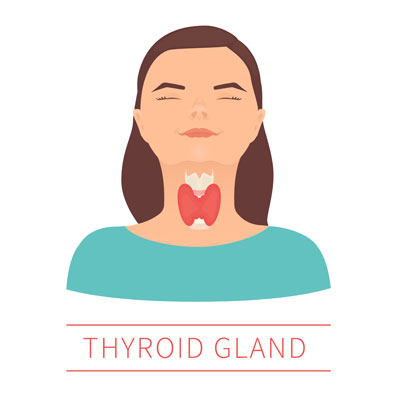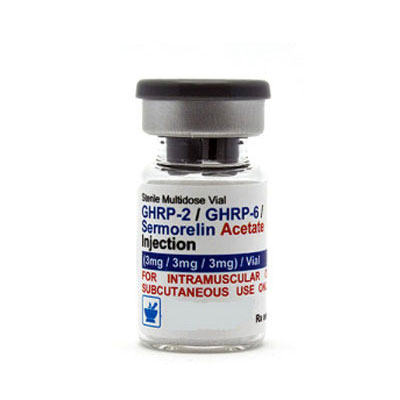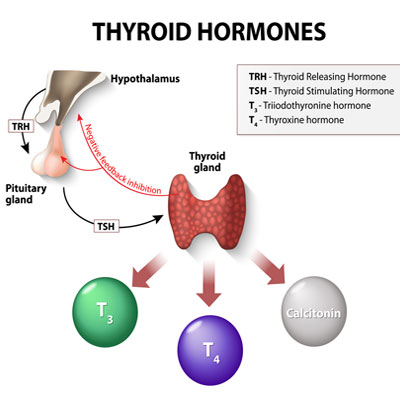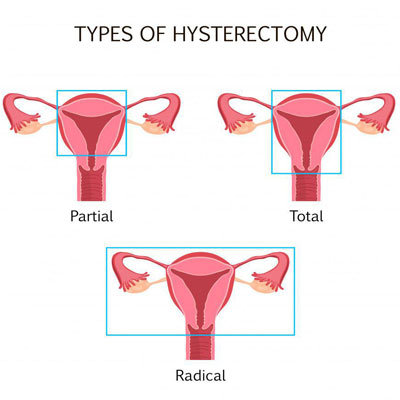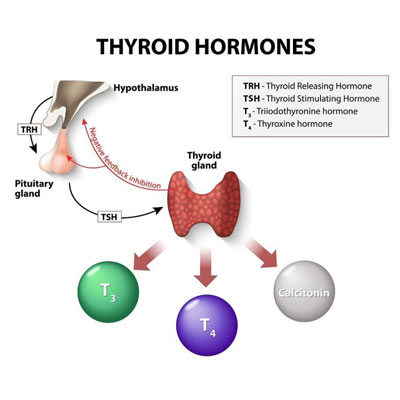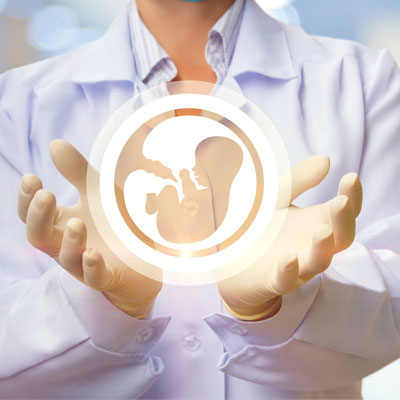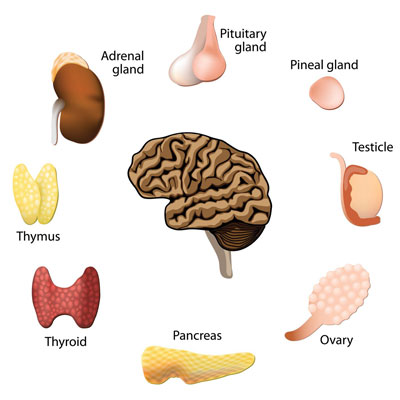Contents
Trusted sourceHealth LineHyperthyroidismGo to sourceHyperthyroidism is a “blanket term” for any situation where too much thyroid hormone is produced by the body. For whatever the reason, the thyroid gland secretes too much thyroid hormone into the bloodstream. Thyrotoxicosis is another term for the condition, meaning elevated blood levels of thyroid hormone.
The butterfly-shaped thyroid gland can be found in the lower front of the neck. The picture above shows the difference between a normal sized and enlarged thyroid. Thyroid hormones get carried by the bloodstream to the body’s tissues.
What causes hyperthyroidism?
Hyperthyroidism is most often caused by thyroid gland overproduction – a condition referred to as Graves’ disease. Blood antibodies attack the thyroid gland, causing it to become enlarged and oversecrete thyroid hormone. Graves’ disease occurs more often in younger women and tends to run in families.
Another form of hyperthyroidism occurs when nodules or lumps begin to grow in the thyroid gland causing an increase in hormone secretion. This type of hyperthyroidism is referred to as multinodular or toxic nodular goiter.
Thyroiditis is caused by a viral inflection or immune system problem that can lead to temporary hyperthyroidism symptoms. Taking too much supplemental thyroid hormone can also cause these concerns. Both these issues may cause increased thyroid hormone secretion that is not due to an overactive thyroid gland.
How does a doctor diagnose hyperthyroidism?
Physical examination and blood analysis help a doctor diagnose hyperthyroidism.
Physical signs include:
- Rapid pulse
- Enlarged thyroid gland
- Moist, smooth skin
- Finger tremors
- Fast reflexes
- Eye abnormalities – in Graves’ disease
Laboratory blood tests measure the following:
- Triiodothyronine (T3)
- Thyroxine (T4)
- Thyroid-stimulating hormone (TSH)
Elevated thyroid hormone levels in conjunction with low TSH readings indicate an overactive thyroid gland as a possibility. The doctor will likely follow this up with a blood test to measure thyrotropin receptor antibodies (TRAbs) to confirm Graves’ disease. A thyroid scan provides a picture of the thyroid to detect a goiter or inflammation (thyroiditis). Finally, a thyroid uptake test measures how well the thyroid gland can collect iodine.
Free T4 (Direct) and TSH levels are routinely checked when looking for HGH deficiency.
How is hyperthyroidism treated?
Treatment for hyperthyroidism depends on the cause, your age, the type of condition, and the severity of the situation. Antithyroid drugs may be used to block hormone secretion by the thyroid gland.
Radioiodine treatment may be used to damage or destroy some of the thyroid cells to decrease hormone secretion. A one-time capsule is swallowed which releases radioactive iodine into the bloodstream to destroy the thyroid cells that take it in. The remaining healthy thyroid cells secrete a normal amount of thyroid hormone into the bloodstream.
Surgery is sometimes necessary to remove all or part of the thyroid gland. Treatment to control hyperthyroidism if necessary before proceeding with surgery. A problem with this surgery is that it typically results in hypothyroidism requiring thyroid hormone supplementation.
It is often recommended to get a second opinion before proceeding with any treatment for hyperthyroidism.
Thyroxine is a hormone secreted by the thyroid gland, and when its levels become too high, you experience a condition called hyperthyroidism. An overactive thyroid causes this condition that can speed up the metabolism and cause irregular (rapid) heartbeat and unexpected weight loss. Because many hormones influence the production of other such chemical messengers, it is not unlikely to be asked the question can HGH cause hyperthyroidism.
It is not uncommon to find multiple hormone deficiencies or imbalances in adult patients with growth hormone decline (GHD). Thyroid hormone levels may be low or high in conjunction with GHD. When asking can HGH cause thyroid problems, it is more likely to find hypothyroidism rather than hyperthyroidism from growth hormone therapy.
What is more concerning is how hyperthyroidism can impact growth hormone secretion. Hyperthyroidism is often seen with increased levels of serum IGF-1 (insulin growth factor 1). IGF-1 is a hormone secreted by the liver following signals from growth hormone. The hypothalamus assesses IGF-1 levels in the bloodstream to determine if more GH is necessary. When hyperthyroidism causes IGF-1 levels to rise, the hypothalamus will then decrease the secretion of growth hormone-releasing hormone (GHRH) and instead send somatostatin to the pituitary gland to reduce GH production. Less growth hormone will then cause a decline in IGF-1 levels.
It is not uncommon to find multiple hormonal imbalances if one hormone level is deficient or in excess.
Effects of HGH on Thyroid Function
The HPT (hypothalamus-pituitary-thyroid) axis becomes unbalanced when any of the hormones involved are in decline or excess. The question can HGH cause thyroid problems is an understandable one as altering any of the hormones produced in those glands can cause problems with other hormones.
Alterations in the HPT are possible with HGH therapy. In one study of twenty men with extreme GH deficiency, the ratio of freeT3:freeT4 in the bloodstream increased. Thyroid binding globulin, thyroglobulin, and serum TSH did not change. While the health-related quality of life improved overall, those individuals who had a decline in free T4 levels had a reduced QoL response than those who did not experience the decline.
Thyroid hormone (thyroxine) itself exerts effects on the metabolic and anabolic effects of growth hormone. It is unlikely that the answer to can HGH cause hyperthyroidism will be yes. It more often than not will result in lower thyroxine levels when HGH supplementation is used. Just as the hypothalamus secretes growth hormone stimulating hormones, it also releases thyrotropin-releasing hormone to the pituitary gland which responds by sending thyroid stimulating hormone to the thyroid gland to produce thyroxine and triiodothyronine. The hypothalamic/pituitary/thyroid link is critical to maintain in proper balance to avoid symptoms of decline or excess as in the case with either hyper or hypothyroidism.
It is unlikely that HGH therapy will cause hyperthyroidism, however, HGH can impact thyroid hormone levels and may result in hypothyroidism.
How to Know If HGH Effects Your Thyroid
Diagnosing hyperthyroidism can be tricky because the symptoms often match those of other health concerns and hormonal imbalances. In fact, many of the signs of hyperthyroidism are the same as those of growth hormone deficiency.
Asking can HGH cause hyperthyroidism is not always necessary. The better option is to look at the symptoms and then get a blood test that will measure all the crucial hormone levels for an imbalance. Hyperthyroidism is more common in women than in men, and increases in postmenopausal women. Growth hormone deficiency risk also increases with age. Symptoms of hyperthyroidism include:
- Rapid heartbeat
- Sweating
- Unexplained weight loss
- Heart palpitations or arrhythmia
- Tremor in hands and fingers
- Menstrual pattern changes – females
- Sweating
- More frequent bowel movements
- Sleep issues
- Fatigue
- Brittle hair
- Thinning skin
- Muscle weakness
- Heat sensitivity
- Goiter – enlarged thyroid gland
Since growth hormone deficiency has many of the same symptoms, a doctor specializing in hormones will run diagnostic blood tests to measure the various hormone levels. Aside from providing information to use for treatment, the test results also give the doctor a baseline to watch how other hormone levels change once any hormone therapy begins.
Baseline and follow-up blood tests monitor hormone levels to ensure no unwanted changes from hormone therapy.
- Dr. Roberto Valcavi, Carlos Dieguez MD,PhD, C Muruais, Felipe F Casanueva MD PhD, Dr I. Portioli
- A. W. Root, Dr. David Shulman, Dr. Eric J Root, F. Diamond
- Dr. Teri Thompson, Dr. Michael O`keeffe and Nathaniel Vinton
- Dr. Joanna Smyczynska, Dr. Maciej Hilczer, Dr N. Med. Renata Stawerska & Prof. med. Andrzej Lewinski
Comparative Study: Influence of hyperthyroidism on growth hormone secretion
Study: The interrelationships of thyroid and growth hormones: effect of growth hormone releasing hormone in hypo- and hyperthyroid male rats.
Article: Thyroid gland may be good indicator for human growth hormone use.
Study: Thyroid function in children with growth hormone (GH) deficiency during the initial phase of GH replacement therapy – clinical implications.

